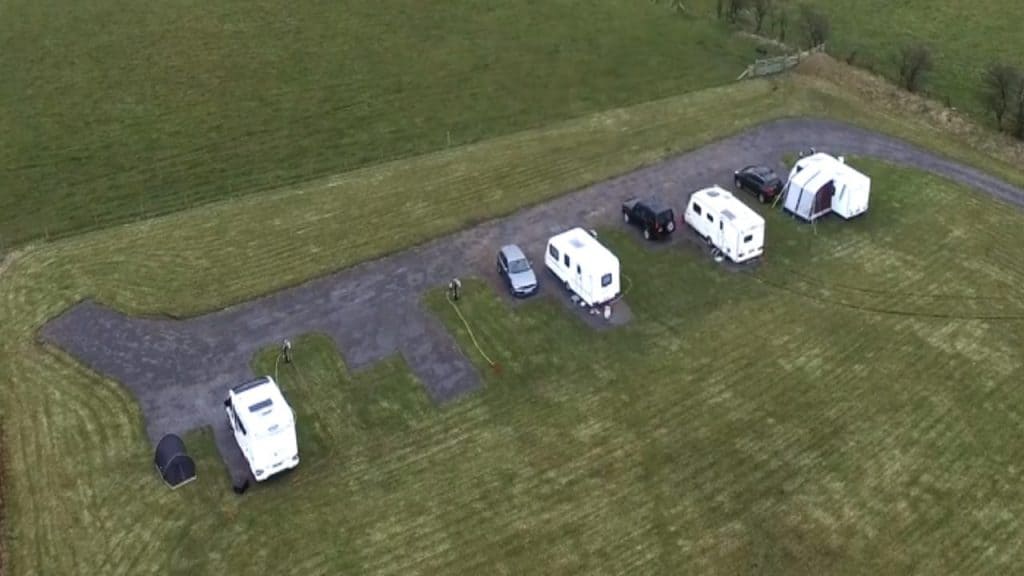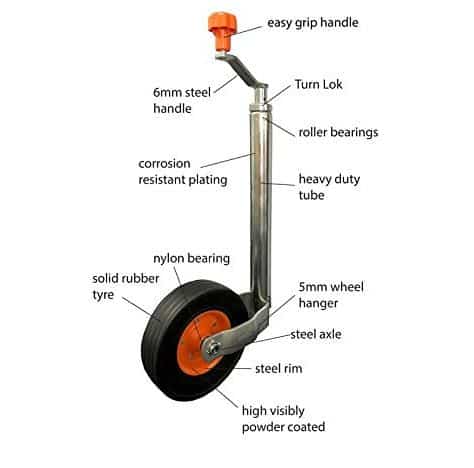
The humble jockey wheel, faithful servant of the caravan to guide it on its merry way. Well, that’s what you hope for, however, from time to time, things go awry. Caravan jockey wheels can get broken and damaged for a range of reasons. However, even if your jockey wheel is not broken, is it actually performing the way you would like? Depending on the ground conditions, some caravan jockey wheels can drag instead of roll. This can be very frustrating for two reasons. When a jockey wheel starts to drag, sooner or later, that’s going to lead to damage and replacement. Furthermore, a dragging jockey wheel makes it much hard to steer the caravan to where you want it.

There is a wide range of caravan jockey wheels available from plastic, air, rubber and motorised. But which are the best?: Image – Amazon.co.uk
Disclaimer: Hey! By the way… any links on this page that lead to products on Amazon or Caravan Guard are affiliate links, and I earn a commission if you make a purchase, with no additional cost to you 🙂
- Dissolves waste and removes odours naturally and has delightful mild fragrance
Several times I’ve come over to meet our guests while they set up their caravan, they have made comments clearly frustrated with the performance of their caravan jockey wheel.
So I thought I would write I post on caravan jockey wheels referencing my own observations, along with those of our guests.
There is a pretty wide range of caravan jockey wheels to choose from. Either solid plastic, air (pneumatic), rubber and even motorised. They are made to various qualities and at different price points.
I’ll also discuss swapping the caravan jockey wheel. If you are interested in a particular type of caravan jockey wheel please use the Table of Contents below to jump to that section.
Want To Visit Horton Common? – Book Here
Table of Contents
Caravan Jockey Wheels – Factors That Effect Performance
Before I discuss the particular types of caravan jockey wheel, I think its best to discuss the various factors that affect their performance.
Its easy to forget (until they break) what an important role a jockey wheel plays in manoeuvring a caravan.
For instance, here at Horton Common, our road goes in front of the pitches. Therefore, caravans have to be reversed onto the pitches.
Now, from my experience, most caravanners find reversing a caravan very tricky indeed. Also, several get concerned about clutch damage.
Therefore, many of our guests uncouple their caravan and use their motormover to position the caravan onto the pitch.

To be able to use a motor mover to steer and direct a caravan, you need the jockey wheel to provide good support and rotation. Our hardstanding is very firm, with only a light gravel dressing.
However, I’ve often witnessed the jockey wheels on our guest’s caravans digging in. This not only makes it harder to steer the caravan, but it also puts more load on the motormover and leisure battery.
Ground Conditions & Jockey Wheels
Typical ground conditions on which you will be trying to manoeuvre your caravan will be tarmac, gravel and grass.
Before we had our road and hardstanding put in at Horton Common, the site was open for two seasons with just grass pitches.
Wet British winters and clay subsoil made it pretty obvious to us that the long-term viability of our site required hard standing.
But what it did provide me with was observations on the performance of caravan jockey wheels on the grass.
First and foremost, if the ground is very wet, every jockey wheel is going to perform pretty poorly. However, some are worse than others.
Narrow solid jockey wheels simply act as a plough, making the process of manuring a caravan on the soft ground even harder. Inflatable jockey wheels can perform better on soft ground.
The reason being they generally provide a wider point of contact with the ground to displace the caravan noseweight.
The performance of a pneumatic jockey wheel on soft ground also depends on the pressure they are inflated too. At lower inflation, they have a wider footprint to displace weight.
However, under lower inflation, when the jockey wheel tries to turn, the tyre can come off the wheel. Therefore, the ability of an inflatable jockey wheel to displace weight becomes pretty redundant.
Solution For Jockey Wheels On Soft Ground
To put this simply, pretty much every caravan jockey wheel you can buy will perform poorly on soft ground. There is just too much weight on such a small area for it to roll and turn properly.
One of the best solutions I observed one of our guests use before we had our road was to use grip mats under and ahead of the jockey wheel.
They had obviously experienced this issue before, and they set it up before they even tried to move their caravan with the motor mover.
Grip mats are typically used by motorhomes to get out of trouble on soft ground, but they are also very useful for caravanners.

On soft ground placing grip mats under your caravans jockey wheel can make a big difference: Image – Amazon.co.uk
Plastic, Air, Rubber Or Motorised Caravan Jockey Wheels?
Now I have discussed the implications of ground conditions, let’s discuss the various options for caravan jockey wheels.
The information below is not intended as an extensive summary of every product available or even a review of such products.
Its just a summary of some of my own thoughts and observations, along with those of our guests here at Horton Common.
Plastic Wheels
Probably the most common jockey wheels I see on our guest’s caravans are the black plastic ones shown in the image below.
Many caravan manufacturers and dealers appear to be going with this particular product. In terms of its performance, it does have a larger and wider rim than I see fitted to a lot of older caravans.
As discussed above, a larger and wider wheel will displace the weight of the caravan to perform ‘better’ on soft ground.

These plastic caravan jockey wheels generally perform ‘ok’, but they can get cracked and damaged. Therefore, its advisable to carry a spare wheel in your caravan locker: Image – Amazon.co.uk
If you do accidentally hit a speed bump, for instance, with this plastic wheel, as reported to me by one of our guests, expect it to break.
While it looks pretty ‘solid’, the reality is the plastic within the rim is pretty thin. Therefore, any sudden impact can shatter the rim.
On the plus side, replacement wheels are pretty cheap. Therefore if you do have a jockey wheel with this particularly plastic rim, I would encourage you to have a spare in your caravan locker.
This type of jockey wheel does also require servicing, which should be carried out by your service centre on your annual visit.
This type and style of plastic jockey wheel, over time, its prone to UV damage. All plastic denatures over time, but UV radiation accelerates the process.
Over time the plastic becomes more brittle and becomes more susceptible to damage.
With these plastic wheels exposed to the sun all year round, don’t expect to get more than five years out of them. I have a similar wheel on our drive gates.
Recently I had to swap them as one day I opened the gate and I could hear a crunching sound. The wheel was literally disintegrating with each rotation.
Inflatable (Pneumatic) Air Wheels
As I discussed above, on soft ground, inflatable jockey wheels can perform better than some others on soft ground.
However, I would say a plastic or rubber jockey wheel with a grip mat underneath will actually perform better.
The other thing you will notice with an inflatable caravan jockey wheel is the ‘bob’.
Once you stop pushing the caravan or using the motor mover with an inflatable tyre, you will notice the caravan bob up and down.
I once observed this with one guest’s caravan, which was a particularly heavy Vanmaster, it looked like the caravan was jumping!

You can even get twin inflatable caravan jockey wheels to provide better weight displacement of the caravan hitch: Image – Amazon.co.uk
As seen in the image above, you can even get twin pneumatic jockey wheels. The idea is to displace even more of the weight of the nose of the caravan to stop the wheels from sinking.
I’ve not actually observed any of our guests using a twin inflatable jockey wheel, so I cannot comment on their performance.
There is obviously one issue every inflatable tyre is susceptible to, and that’s punctures.
Inflatable Jockey Wheel Punctures
The nose weight of many caravans in the UK is between 80-100kg. Therefore, that is quite a lot of weight to put on one wheel (obviously, its more displaced with two wheels).
If there was a small nail etc, its not going to have much trouble getting through the relatively thin rubber of these jockey wheel tyres.
I did have one guest who tried using that tyre foam injection product they use for car tyres. However, they didn’t find it was a good solution.
Rubber Caravan Jockey Wheels
You generally find that many of the ‘premium’ caravan jockey wheels use rubber tyres. They tend to avoid inflatable tyres due to the potential puncture issues.
The most recent of the premium caravan jockey wheels is a product developed by Kartt in collaboration with the Camping and Caravanning Club.
Kartt has been producing a range of caravan jockey wheels for many years, but with this particulary product, they are making the bold statement of ‘The Ultimate Caravan Jockey Wheel”.

I’ve yet to see this particular jockey wheel fitted to one of our guest’s caravans, but I have seen Kartt jockey wheels in the past. They are pretty hard to miss with the bright orange rim centre.
Build quality does appear to be pretty high, as you would want, with a premium product at a premium price point.
What is noticeable is the load capacity of 250kg! Now that’s far beyond the requirements of almost all UK caravans.
You pretty much only see a noseweight (or tongue weight) as high as that on a US or Australian caravan. But it does emphasize where Kartt is going with this product on build quality.
The Advantage Of A Proper Wheel Bearing
Something I do particularly like about the Kartt jockey wheels is the proper wheel bearing.
Typically with plastic or inflatable jockey wheels, there is no wheel bearing, so to speak, its just a plastic rim rotating on a metal shaft.
Now, there may be a bit of grease on there to help, but over time with weather etc, that will wear away. Without a proper wheel bearing and a high noseweight on the caravan, that creates friction.
This friction increases the rolling resistance, which means its harder to navigate and steer the caravan.
So ideally, whatever type of caravan jockey wheel you choose, try and pick one that has a proper wheel bearing in place.
Replacing a Caravan Jockey Wheel for the Kartt
As stated above, I’ve not personally seen this particularly Kartt caravan jockey wheel in action as yet. Therefore I cannot really add more impressions on it.
However, Dan (Meet the Trudgians) has replaced his old plastic jockey wheel with the Kartt and appears to be quite impressed with it.
Motorised Jockey Wheels
Now, along with your common plastic, rubber and inflatable jockey wheels, there are the more niche motorised jockey wheels.
I have briefly referenced them in the past in my post on caravan motor movers. I’ve only ever had one guest with a motorised jockey wheel, and personally, I’m not a fan.
I just think they are very limited in their application. The core issue relates to my discussion earlier in this post on ground conditions.
With a motorised jockey wheel, you’re trying to use a very small single wheel to push and pull a caravan.
Even on a hard surface, its going to be rare that the jockey wheel will have enough traction without slipping, trying to move the caravan in a controllable fashion.

Personally, I think that motorised caravan jockey wheels are not suitable for most caravanners: Image – Amazon.co.uk
The other issue is weight, or specifically noseweight. The motorised caravan jockey wheel in the image above weighs 17kg.
In most cases, that’s going to cause real issues getting the nose weight of your caravan within its rated limit and the limit of your car.
On all but the flattest, smoothest and firmest surfaces, I can see issues trying to move a caravan with a motorised jockey wheel.
Conclusions On Caravan Jockey Wheels
First, when it comes to soft ground, even the ‘Ultimate Caravan Jockey Wheel’ from Kartt is going to have issues.
Yes, larger and wider (or multiple) wheels can help but really, my best advice, as stated above, is to have some grip mats to hand to place under the caravan jockey wheel.
In general, I’m not a fan of inflatable jockey wheels, and neither are many of our guests.
The potential upside of improved soft ground performance comes with the significant downside of potential punctures and the tyre coming off the rim.
Therefore, personally, I prefer a solid wheel. You can get premium products such as the Kartt, but expect to pay a premium price.
If you have the cash to spare, it does appear from the description to be a well-made product.
When I do see a guest turn up with a Kartt jockey wheel on their caravan, I am interested in getting their feedback on it.
I hope you found this post useful if you need to consider a new replacement caravan jockey wheel.
I also hope you consider coming to visit us here at Horton Common in the near future and our serviced pitches. 🙂
Want To Visit Horton Common? – Book Here


